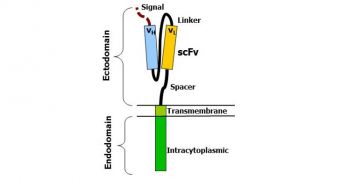According to a paper published in the latest issue of the AACR journal Cancer Immunology Research, immune system cells engineered by researchers proved successful in attacking tumors in two patients with advanced cancers that were previously unresponsive to any type of treatment.
CARTmeso cells target a protein called mesothelin, which some tumors express as they develop. The new study indicates that all tumors featuring this molecule may become potential targets for these cells, and argues that patients may experience improved survival rates as a result, EurekAlert reports.
Chimeric antigen receptor T cells (CART cells) were initially extracted from the patients' own immune systems as T cells. Researchers then engineered them to contain a molecule capable of tracking mesothelin, and then killing whatever cell the protein is attached to. Since mesothelin attaches to cancer cells, the approach is highly-targeted.
“So far, researchers have been permanently modifying T cells by using a variety of methods, including using viruses. We engineered T cells to express a CAR for about three days, after which the mRNA is metabolized rapidly by the system, so the T cells basically revert to what they were before in the patient,” says researcher Carl H. June, MD.
He holds an appointment as a professor of pathology and laboratory medicine in the Perelman School of Medicine at the University of Pennsylvania, and is also the director of translational research at the UP Abramson Cancer Center.

 14 DAY TRIAL //
14 DAY TRIAL //